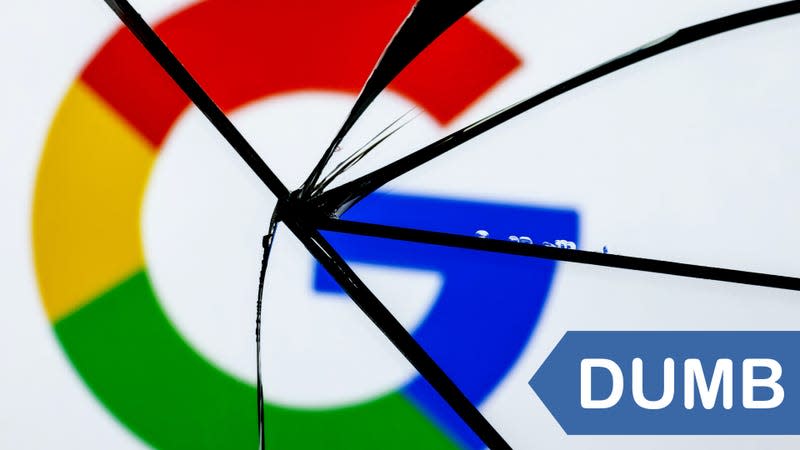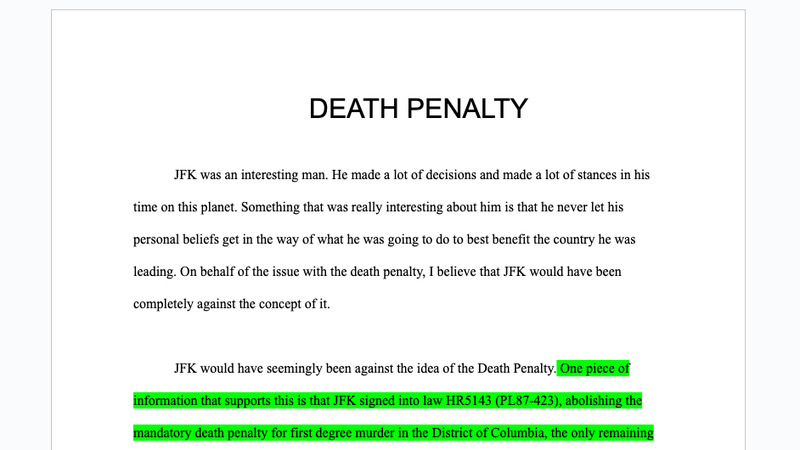Dumbest Google Result of the Week: ‘JFK Death Penalty’ Brings Up Some Kid’s Middle School Essay

“JFK was an interesting man.” At least, that’s the first thing you read if you follow the top Search result for variations of “Did JFK support the death penalty?” Google turns up 7.5 million results, but for some reason, it starts you off with a Google Doc that appears to be a middle schooler’s homework assignment.
The first page of results for the phrase “JFK Death Penalty” brings up a variety of sources. Second among them is an entry from the John F. Kennedy Presidential Library, dedicated to a law the former President signed abolishing capital punishment in Washington D.C. But don’t let the thought police tell you we should rely on some library just because it’s responsible for upholding JFK’s “official” legacy. Google’s robots can see through that kind of noise: the internet giant decided that a document titled DEATH PENALTY holds the most authoritative information.
Read more
Actors kept thanking a non-existent body at the Golden Globes
Jimmy Kimmel drags Aaron Rodgers within an inch of his life over Epstein comments
Here’s why you know that song from Will Ferrell and Kristen Wiig’s hilarious Golden Globes bit
Would You Live in R. Kelly's Newly Listed $3 Million 'Chocolate Factory' Mansion? A Look Inside
Whatever brought that poor kid’s homework to the top of Google, I’m happy (or sorry) to say the problem is fixed. In the days after we reached out to Google for comment, the student’s essay stopped appearing on Search. Giving weird internet phenomena a lot of attention is often the kiss of death, but a Google spokesperson told Gizmodo the company didn’t intervene. The spokesperson said the “Featured Snippets” section where the Google Doc appeared is “determined automatically, based on factors like relevance, quality, and freshness.” The good news is we’ve mirrored the essay for posterity. You can read it here, complete with the relevant portions that were originally highlighted by your friends at Google.
Children’s essays or otherwise, it’s bizarre for Search to turn up Google Docs for anyone who isn’t looking for them specifically, let alone for the subject of a President’s policy positions.
“We build Search to surface high quality information from reliable sources, especially on topics where information quality is critically important,” a Google spokesperson said. “Sometimes, there’s just not a lot of great content on the web to show for a particular search. It’s uncommon for Google Docs content to appear for a featured snippet, and we agree that we could surface a better result here. We’re looking into it further to see how we can improve on queries like this.”
In Google’s defense, the waters are a little muddy given the fact that the similarly named former Supreme Court Justice Anthony Kennedy weighed in on capital punishment. Then there’s the sad reality of John and Robert Kennedy’s unfortunate associations with the word death. On the other hand, this doesn’t seem like a hard one.
Over the past few years, consumers and experts alike have complained that Google Search is getting worse. That’s a difficult issue to measure; how do you judge whether search results are good or bad? The company certainly has metrics of its own, but Google isn’t about to tell the world its products are deteriorating. I’ve asked various Google employees about it in the past. Most swear that Search is still great. But at the very least, it’s gotten so bad that many people now add the word “Reddit” to searches to increase the chance that they’ll find something useful. Still, Google’s spokesperson said that numerous third-party studies have found the company’s Search tool is best in class.

Google’s top choice for JFK’s stance on this thorny political issue, featuring a delightfully off-center title.
What we can say is Google has been trying all kinds of shenanigans on its flagship product. For one, Google Search increasingly favors Google products, picking its own services as the first answer in many cases. Then there’s the fact that the company loaded up Search with so many ads over the years that they practically spill off the edges of your screen. Some Searches fill the entire screen with marketing content that you have to scroll past to find actual results. At the same time, Google shrunk the labels disclosing that you’re looking at an ad, making things harder to parse. Criminals have caught on to that phenomenon. It’s so bad the FBI recommends you use an ad blocker to avoid search engine ad scams.
Google’s spokesperson said the company works to provide a valuable and relevant advertising experience. Google maintains that ads only showed up at the top of 20% of searches over the past four years. The spokesperson said the “highly prominent” labels it places on its ads are industry-leading and designed to catch users’ attention.
Search is also a victim of the tech industry’s effort to shove AI into every corner of our internet. Google’s “Search Generative Experience” now pulls up chatbot answers for some queries, though this is an opt-in feature—for now. It isn’t always great. For example, we caught Google’s AI Search doling out justifications for slavery and cooking instructions for poisonous mushrooms. Google is so keen on AI that it quietly removed the suggestion that content be “written by people” in its recommendations for websites that want to do well in Search results.
Meanwhile, website owners’ desperate attempts to game Google and show up high on the page through “Search Engine Optimization” have reached absolute chaos. In 2023, a Gizmodo investigation found the tech news outlet CNET deleted thousands of articles because its team felt that would aid in the site’s Search Performance. Google told Gizmodo it doesn’t recommend this practice, though some experts suggest the company’s official guidance says otherwise.
It’s like I said, JFK was an interesting man.
Update 2:45 p.m.: This article has been updated with Google’s comments about the unusual search result. As of this afternoon, the query stopped surfacing the child’s essay.
Update 4:25 p.m.: A previous version of this article said the child’s essay was “stripped” from search results after Gizmodo asked the company about it. A Google spokesperson said “there was no manual action taken” to change the results.
More from Gizmodo
Spider-Man's MJ Face Model Asks Fans To Stop Stalking And Harassing Her
You've Probably Never Heard Of The Coolest Canadian Car Ever Built
Here’s what the twisted minds at Adult Swim did with Steamboat Willie
Monsieur Spade review: Clive Owen’s hardboiled performance is très magnifique
Sign up for Gizmodo's Newsletter. For the latest news, Facebook, Twitter and Instagram.

